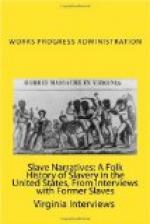Emancipation came and with it great rejoicing. He recalls that Republicans were called “Radicals” just after the close of the Civil War.
Mr. Lane was able to save all of his meat, silver, and other valuables during the war by having a cave dug in the hog pasture; the hogs trampled over it daily.
“Parson” states that among the papers in his trunk he has a piece of money called “shin plasters” which was used during the Civil War.
The slaves were not allowed to attend schools of any kind; and school facilities immediately following Emancipation were very poor; when the first teacher, Miss Smith, a Yankee, came to Sparta, Georgia and began teaching Sunday School, all of the children were given testaments or catechisms which their parents were afraid for them to keep lest their masters whip them, but the teacher called on the parents and explained to them that they were as free as their former masters.
“Parson” states that when he was born, his master named him “Monk.” His grandfather, Willis Andrews, who was a free man of Pittsburg, Pennsylvania, purchased the freedom of his wife Lizzie, but was never able to purchase their four children; his father, also named Willis, died a slave, was driven in an ox-cart to a hole that had been dug, put in it and covered up; his mother nor children could stop work to attend the funeral, but after the Emancipation, he and a brother returned, found “Uncle Bob” who helped bury him and located his grave. Soon after he had been given his freedom, “Parson” walked from Union Springs, Alabama where his last master had taken him—back to Macon, Georgia, and rejoined his mother, Rachel, his brothers, Samuel Augustus, San Francisco, Simon Peter, Lewis, Carter, Powell Wendell and sisters, Lizzie and Ann; they all dropped the name of their master, Lane, and took the name of their grandfather, Andrews.
“Parson” possesses an almost uncanny memory and attributes it to his inability to write things down and therefore being entirely dependent upon his memory. He had passed 30 years of age and had two children who could read and write before he could. His connection with Edward Waters College has given him a decided advantage for education and there are few things that he cannot discuss intelligently. He has come in contact with thousands of students and all of the ministers connected with the African Methodist Episcopal Church in the State of Florida and has attended all of the State and General Conferences of this Church for the past half century. He has lived to be 85 years of age and says he will live until he is 106. This he will do because he claims: “Your life is in your hand” and tells these narratives as proof:




